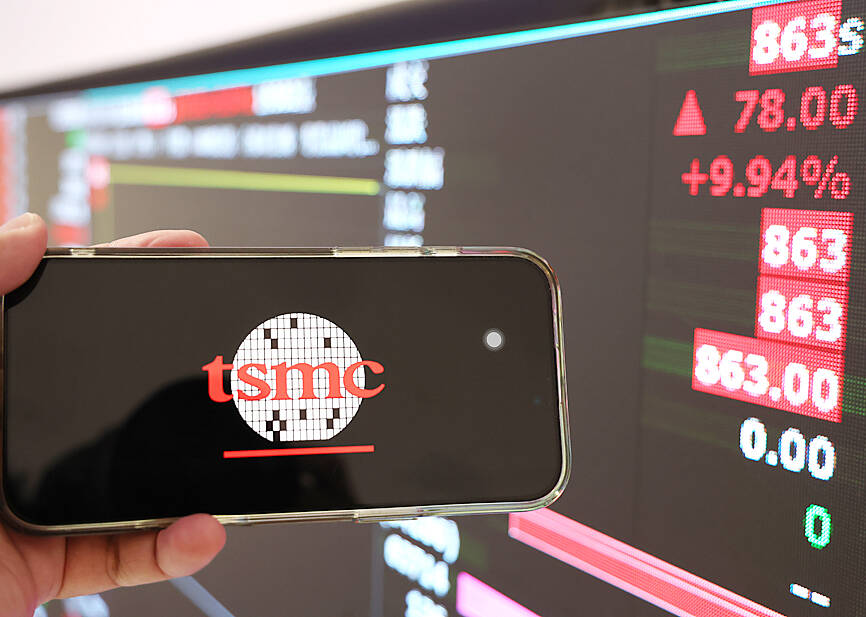Taiwan Semiconductor Manufacturing Co’s (TSMC, 台積電) quarterly revenue rose a larger-than-anticipated 41.6 percent from a year earlier, reflecting strengthening demand for artificial intelligence (AI) servers and smartphones before US tariffs kicked in.
That marked TSMC’s fastest pace of growth since 2022. Electronics manufacturers had stockpiled goods in US warehouses in anticipation of potential trade and shipping disruptions.
The main chipmaker for Apple Inc and Nvidia Corp yesterday reported revenue of NT$839.25 billion (US$25.5 billion) in the first three months of this year. Analysts on average expected roughly NT$830.5 billion.

Photo: CNA
Last month alone, TSMC’s revenue was NT$285.96 billion, up 46.5 percent from a year earlier and a record high in the company’s history.
The company is to report full quarterly earnings on Thursday next week, along with its outlook for the current quarter.
US President Donald Trump’s 90-day pause on higher tariffs might mean more stockpiling in the months ahead, shoring up TSMC’s June quarter, according to Bernstein analysts led by Mark Li.
“We think AI demand, despite some recent noises, will still grow notably year-on-year,” they said in a note to investors.
Shares of TSMC closed up 9.94 percent in Taipei trading yesterday.
TSMC’s results coincide with growing concerns about how tariffs may disrupt demand for electronics such as iPhones. Over the weekend, Americans rushed to pick up Apple’s marquee device, fearing it may raise prices to cover the additional cost.
Some analysts said TSMC might have to cut its full-year revenue target for growth in the mid-20 percent range, reflecting global uncertainty and the potential hit to economies. The company’s outlook is overshadowed also by Trump’s threats to slap tariffs on semiconductor imports, although it is unclear when or whether that might happen.
Still, TSMC remains the world’s leader in the production of advanced semiconductors used for AI devices and smartphones. That could cushion the impact of tariffs or trade disruptions.

SELL-OFF: Investors expect tariff-driven volatility as the local boarse reopens today, while analysts say government support and solid fundamentals would steady sentiment Local investors are bracing for a sharp market downturn today as the nation’s financial markets resume trading following a two-day closure for national holidays before the weekend, with sentiment rattled by US President Donald Trump’s sweeping tariff announcement. Trump’s unveiling of new “reciprocal tariffs” on Wednesday triggered a sell-off in global markets, with the FTSE Taiwan Index Futures — a benchmark for Taiwanese equities traded in Singapore — tumbling 9.2 percent over the past two sessions. Meanwhile, the American depositary receipts (ADRs) of Taiwan Semiconductor Manufacturing Co (TSMC, 台積電), the most heavily weighted stock on the TAIEX, plunged 13.8 percent in

A wave of stop-loss selling and panic selling hit Taiwan's stock market at its opening today, with the weighted index plunging 2,086 points — a drop of more than 9.7 percent — marking the largest intraday point and percentage loss on record. The index bottomed out at 19,212.02, while futures were locked limit-down, with more than 1,000 stocks hitting their daily drop limit. Three heavyweight stocks — Taiwan Semiconductor Manufacturing Co (TSMC, 台積電), Hon Hai Precision Industry Co (Foxconn, 鴻海精密) and MediaTek (聯發科) — hit their limit-down prices as soon as the market opened, falling to NT$848 (US$25.54), NT$138.5 and NT$1,295 respectively. TSMC's

TARIFFS: The global ‘panic atmosphere remains strong,’ and foreign investors have continued to sell their holdings since the start of the year, the Ministry of Finance said The government yesterday authorized the activation of its NT$500 billion (US$15.15 billion) National Stabilization Fund (NSF) to prop up the local stock market after two days of sharp falls in reaction to US President Donald Trump’s new import tariffs. The Ministry of Finance said in a statement after the market close that the steering committee of the fund had been given the go-ahead to intervene in the market to bolster Taiwanese shares in a time of crisis. The fund has been authorized to use its assets “to carry out market stabilization tasks as appropriate to maintain the stability of Taiwan’s

STEEP DECLINE: Yesterday’s drop was the third-steepest in its history, the steepest being Monday’s drop in the wake of the tariff announcement on Wednesday last week Taiwanese stocks continued their heavy sell-off yesterday, as concerns over US tariffs and unwinding of leveraged bets weighed on the market. The benchmark TAIEX plunged 1,068.19 points, or 5.79 percent, to 17,391.76, notching the biggest drop among Asian peers as it hit a 15-month low. The decline came even after the government on late Tuesday authorized the NT$500 billion (US$15.2 billion) National Stabilization Fund (國安基金) to step in to buoy the market amid investors’ worries over tariffs imposed by US President Donald Trump. Yesterday’s decline was the third-steepest in its history, trailing only the declines of 2,065.87 points on Monday and